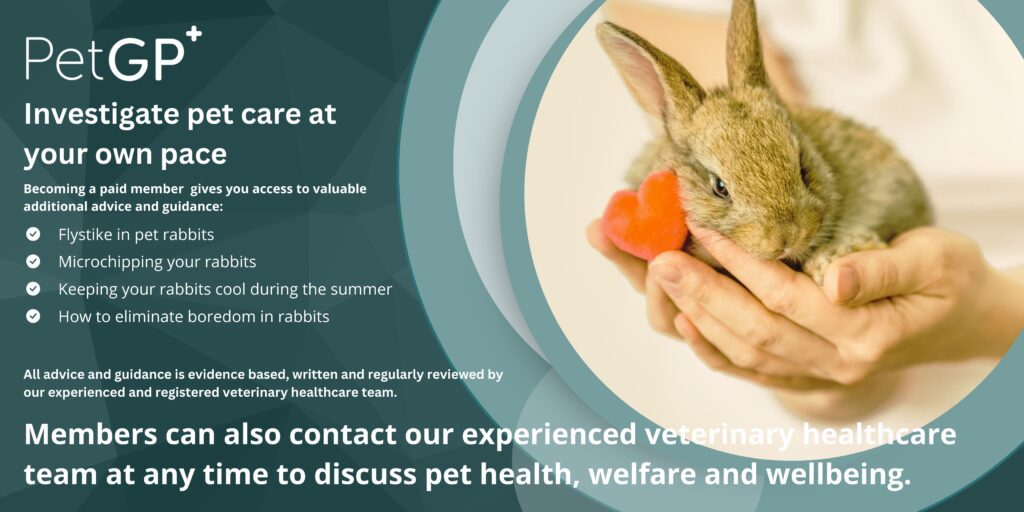How do I support my rabbit’s mental health?
Mental Health is a growing topic in human medicine. Animals can also suffer with mental health problems. They are much harder to diagnose but there are lots of ways in which we can help. We all want to keep our rabbits as happy and as healthy as possible, so caring for your rabbits’ mental health should be as important as looking after their physical wellbeing.
There are many factors involved in your rabbits’ mental health. Rabbits have different personalities, and certain individuals can be more at risk of developing mental health issues. Prevention is always much better than a cure. Catering for all of your rabbits’ needs will help to keep them well. Ensuring that your rabbits have an environment in which they can express all their normal behaviours will reduce their stress levels and occupy their minds.
Ability to express normal behaviours
Rabbits normal behaviours include digging, running, jumping, standing up on the hind legs, hiding, exploring, foraging and eating, being on their own or socialising with other rabbits. If rabbits do not have the space, companionship, food availability or objects to interest them in their environment, their mental health will suffer. They will slip into a low mood or depression, or they will develop abnormal repetitive behaviours such as cage chewing, circling or over-grooming. Planning your rabbits’ environment, along with ensuring they have companionship of their own kind will support their health. Providing lots of enrichment opportunities is also key to keeping your rabbits healthy and happy.
Suitable environment
Rabbits need a lot of room! Ideally, they need access to a large exercise area all the times. This is essential at least from late afternoon to the next morning when they are most active. The exercise area should have spaces to explore and to hide in. It can also incorporate platforms for standing on and toys to play with. Always ensure that you include somewhere to dig and fresh food materials to encourage foraging . The ideal temperature range for rabbits is 10-20°C, out of full sun and sheltered from rain, snow and wind. A good environment with plenty of opportunity to express natural behaviours is key to ensuring your rabbits maintain good mental health.
Suitable diet
Rabbits must have access to good quality hay at all times. The long fibre in hay is vital for gut and dental health. Foraging also helps occupy the rabbit when it is active. Rabbits fed hay spend more time feeding, in a natural grazing posture. Having hay freely available increases the rabbits’ activity and reduces abnormal behaviours. Fresh greens and veggies also add interest and encourage the rabbit to explore and forage if placed around the run. A small amount of grass-based pelleted food should be offered daily to ensure correct nutrition is maintained. Encouraging natural behaviours helps to improve your rabbits mental health.
Interaction with other rabbits
Rabbits are social animals that need the company of their own kind. They can be kept in pairs or groups with all animals neutered to reduce fighting and prevent breeding. Groups offer more varied socialising than pairs. This can also increase the chance of fighting if the enclosure is not big enough.
Staying healthy and free from disease
The links between physical and mental health are now being recognised in animals. Rabbits with health problems are more likely to suffer from stress, while stressed rabbits are more likely to become ill. Having a health check for any rabbit that is showing abnormal behaviours is always advised.
Stressful situations
Rabbits are easily stressed so any changes such as a house move, a new pet in the house or a dietary change should be carefully planned to help the rabbit adjust smoothly.
House rabbits can be very unsettled by guests and gatherings, building work or decorating in the house. Keeping rabbits in an area that is less disturbed by guests or noise will help. If it involves moving the rabbits from their normal range of access, then planning and gradual restriction is needed. More enrichment may be added to help keep them occupied.
Outside rabbits are more affected by fireworks, outside parties or gardeners working in the area. Partially covering the run with tarpaulin can help to give more hiding places – but ensure that ventilation is still good.
Compulsive behaviours or stereotypies
Some rabbits that lack things to do develop unusual behaviours if they are bored or unhappy. This can lead to rabbits with poor mental health. Chewing and pulling at the bars of the hutch, constant licking at water bottles, circling, digging in a corner and swaying or weaving of the head are all stereotypic behaviours. Other rabbits can develop an apathetic behaviour when bored – just sitting with no interest in their surroundings.
Overgrooming is also common - the rabbit obsessively licking, chewing or pulling at the fur. Some rabbits start pacing or circling in their enclosures if there is nothing to distract them.
Increasing the space for the rabbits and adding things to play with, hide in, destroy or just chew will help to occupy them.
Signs that your rabbits may have poor mental health
It is important to be able to tell how your rabbit is feeling by reading their body language. A happy, healthy rabbit will move about normally, will forage and be alert, with the ears up. When resting, they look relaxed in a comfortable position. They will socialise normally with their housemates. Rabbits with poor mental health are unlikely to show these behaviours.
Stereotypic behaviours are mainly seen when the rabbits are most active overnight. Check for the results of these behaviours in the mornings. Clumps of loose fur in the hutch, chewed wood, or damage from digging or chewing are all signs of abnormal behaviour.
A depressed or unwell rabbit will be most likely be found on its own. It will likely be sitting hunched up in a corner, not grooming or taking any notice of its surroundings. An anxious or worried rabbit holds the ears close to the body and sits flat to the ground. They may hide or run away from their companions or you.
Any behavioural change needs careful monitoring and a vet check to make sure that there are no underlying health problems.
Rabbits are easily stressed, so you need to know your rabbits’ normal behaviour and act if that behaviour changes. Subtle changes are the first signs that the rabbit has poor mental health or is unhappy. A vet check, management of any conditions identified and adjustment to the husbandry will all help.

